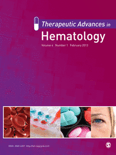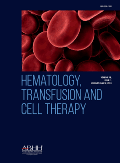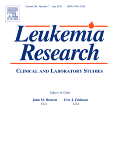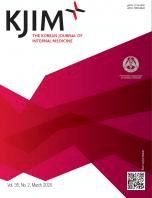
Mediterranean Journal of Hematology and Infectious Diseases
Scope & Guideline
Connecting scholars to elevate hematology and infectious disease studies.
Introduction
Aims and Scopes
- Hematological Disorders:
The journal covers various hematological conditions including leukemias, lymphomas, myeloproliferative disorders, and anemias, focusing on their diagnosis, treatment, and management. - Infectious Diseases in Hematology:
Research on infectious complications in hematological patients, particularly those undergoing treatments like chemotherapy or stem cell transplantation, is a core focus. - Molecular and Genetic Studies:
The journal publishes studies on genetic predispositions, molecular alterations, and their implications for treatment strategies in hematological malignancies. - Innovative Therapies:
It highlights advancements in treatment modalities such as CAR-T cell therapy, monoclonal antibodies, and gene editing technologies for hematological diseases. - Real-World Evidence and Clinical Practice:
The journal emphasizes real-world studies and clinical outcomes to guide practice standards in hematology and infectious diseases. - Public Health and Epidemiology:
Research addressing the epidemiological aspects of hematological diseases and their interaction with public health issues, particularly in low-resource settings, is also featured.
Trending and Emerging
- Personalized Medicine and Genetic Profiling:
There is an increasing emphasis on personalized medicine, particularly the use of genetic profiling to tailor treatments for individual patients, especially in hematological malignancies. - CAR-T Cell Therapy and Immunotherapies:
Research on CAR-T cell therapies and other forms of immunotherapy is rapidly growing, reflecting a shift towards innovative treatments for hematological cancers. - Long-Term Outcomes and Survivorship Studies:
An emerging focus on the long-term outcomes of patients who have survived hematological malignancies, including quality of life and late effects of treatment. - Infectious Disease Management in Immunocompromised Patients:
There is a heightened interest in managing infectious diseases specifically in immunocompromised patients, particularly those undergoing hematological treatments. - Health Disparities and Global Health:
Research addressing health disparities, particularly in low-resource settings, is becoming more prominent, focusing on access to care and treatment outcomes. - Integration of Technology in Treatment:
The application of technology, such as telemedicine and digital health tools, in monitoring and managing patients with hematological disorders is gaining traction.
Declining or Waning
- Traditional Chemotherapy Approaches:
There has been a noticeable reduction in studies focusing solely on traditional chemotherapy regimens without combination therapies, as newer treatment modalities gain preference. - Basic Laboratory Techniques:
Research centered around basic laboratory methods and techniques has decreased, likely overshadowed by the growing complexity and specificity of molecular and genetic studies. - Infectious Disease Studies Outside Hematology:
The focus on infectious diseases that are not specifically related to hematology, such as general epidemiological studies, seems to be waning in favor of more targeted research within hematological contexts. - Single-Center Studies:
There is a decline in the publication of single-center studies, as there is a growing trend towards multicenter collaborations that provide broader, more generalizable findings. - Aging and General Health Studies:
Research focusing on general health issues and aging populations, unless directly related to hematological conditions, appears to be less frequent in recent publications.
Similar Journals

Therapeutic Advances in Hematology
Fostering collaboration for a healthier tomorrow.Therapeutic Advances in Hematology is a prestigious, peer-reviewed journal dedicated to advancing the field of hematology through innovative research and clinical studies. Published by SAGE Publications Ltd, this journal has become a vital resource for hematology professionals and researchers since its inception in 2010. With its impactful Q1 ranking in Hematology and a Scopus rank of 62 out of 137, it firmly establishes itself as a leader in disseminating significant findings and therapeutic approaches. The journal has been committed to open access since 2019, ensuring that its cutting-edge research is readily available to the global scientific community. Covering a broad scope of topics within hematology, Therapeutic Advances in Hematology is an essential platform for those seeking to enhance their understanding and implementation of therapeutic practices in hematological conditions. The journal embraces submissions from both clinical and laboratory perspectives, fostering collaboration and dialogue among researchers, clinicians, and students alike.

HemaSphere
Delivering cutting-edge insights to the hematology community.HemaSphere, published by WILEY, stands at the forefront of hematology research, offering a vital platform for the dissemination of cutting-edge findings in the field. Since its inception in 2017 and official transition to Open Access in 2018, the journal has positioned itself as a leading conduit for high-impact research, maintaining a prestigious Q1 quartile ranking in the Hematology category as of 2023. Addressed in the United States at 111 River St, Hoboken, NJ, HemaSphere aims to foster a global dialogue among researchers, clinicians, and students by providing unrestricted access to high-quality content that encompasses clinical and experimental advancements. With an array of engaging articles, reviews, and commentaries, HemaSphere contributes significantly to the advancement of hematology, ensuring that critical knowledge is readily accessible to enhance patient care and innovative research. To explore the latest developments and breakthroughs in this dynamic field, we invite scholars, professionals, and students to engage with HemaSphere and elevate their understanding of hematologic science.

Iraqi Journal of Hematology
Connecting Global Scholars in Blood ScienceIraqi Journal of Hematology is a prominent peer-reviewed open-access journal dedicated to advancing the field of hematology. Published by Wolters Kluwer Medknow Publications, this journal provides a platform for researchers, professionals, and students to share cutting-edge findings and developments in various aspects of hematology, including blood diseases, diagnostics, and innovative treatments. Since its transition to open access in 2016, the journal has significantly increased its reach, allowing for wider dissemination of critical research to a global audience. With an ISSN of 2072-8069 and an E-ISSN of 2543-2702, the Iraqi Journal of Hematology strives to adhere to the highest scholarly standards and plays a vital role in the ongoing discourse in hematological research. Researchers are encouraged to contribute to this essential resource for the scientific community, contributing to the advancement of knowledge that ultimately improves patient care and treatment outcomes.

Indian Journal of Hematology and Blood Transfusion
Inspiring Progress in Blood Health Through Rigorous ResearchIndian Journal of Hematology and Blood Transfusion, published by SPRINGER INDIA, serves as a leading platform for disseminating original research, reviews, and case studies in the field of hematology. With an ISSN of 0971-4502 and E-ISSN 0974-0449, this journal has been instrumental in advancing knowledge from 2000 to 2024, providing insights into critical issues surrounding blood disorders and transfusion practices. Currently ranked in the Q3 category for Hematology for 2023, it reflects a commitment to high-quality scientific content amidst a competitive landscape where it ranks 97/137 in Scopus for Medicine - Hematology, placing it in the 29th percentile of its peers. The journal primarily addresses a diverse readership, including researchers, healthcare professionals, and students, aiming to foster innovation and collaboration within the field. Although it operates under a subscription model, access options for individual articles and institutional subscriptions ensure that valuable research is disseminated widely to enhance medical practice and education in hematology.

Journal of Blood Medicine
Connecting Minds: Bridging Research and Clinical Practice in HematologyThe Journal of Blood Medicine, published by DOVE MEDICAL PRESS LTD, stands as a vital resource in the field of hematology, focusing on the latest research developments and clinical advancements in blood medicine. With an impact factor reflective of its growing relevance, this open-access journal has been delivering quality scholarly work since 2010, ensuring that critical research is readily available to the global scientific community. The journal operates under an open-access model, further enhancing its dissemination and accessibility to researchers, professionals, and students alike. In the 2023 rankings, it secured a Q3 category status within hematology and achieved a commendable 76th rank out of 137 in Scopus listings, indicating its commitment to quality and innovation in this specialized area. Located in New Zealand, the journal's diverse topics encompass clinical research, treatment modalities, and emerging therapies, contributing significant insights vital for shaping future advancements in blood medicine.

Hematologie
Advancing the Science of Blood DisordersHematologie is a highly regarded journal in the field of hematology, published by JOHN LIBBEY EUROTEXT LTD. With an ISSN of 1264-7527 and an E-ISSN of 1950-6368, this journal has established itself as a vital resource for researchers, clinicians, and students dedicated to advancing the understanding of blood disorders and treatments. Although the journal's coverage in Scopus was discontinued in 2018, it has continually provided invaluable insights and research findings. The journal aims to foster knowledge sharing and discussion in hematology, exploring innovative methodologies and emerging trends in the field. With a commitment to quality research, Hematologie remains an essential platform for disseminating critical findings that can drive clinical practice and influence future studies in hematological sciences.

ACTA HAEMATOLOGICA
Fostering Innovation in Blood Science ResearchACTA HAEMATOLOGICA, published by KARGER, is a prestigious journal established in 1948, dedicated to the field of hematology and related medical sciences. With an ISSN of 0001-5792 and an E-ISSN of 1421-9662, this journal stands out with a Q2 ranking in both Hematology and Miscellaneous Medicine categories as of 2023. Researchers and professionals can benefit from its high-quality peer-reviewed articles, contributing to a more profound understanding and advancement of hematological practices. Although it does not offer open access options, ACTA HAEMATOLOGICA remains an essential resource for researchers in Switzerland and worldwide, providing critical insights and fostering discourse among academic and clinical communities. The journal's address is located in the heart of Basel, Switzerland, ensuring its robust connection to European medical research networks. With a firm commitment to excellence, this publication plays a vital role in disseminating knowledge, guiding future innovations in the field.

Hematology Transfusion and Cell Therapy
Innovating the future of blood disorder management.Hematology Transfusion and Cell Therapy, published by Elsevier, is a leading Open Access journal dedicated to advancing the fields of hematology, immunology, and transfusion medicine. Since its establishment in 2018, this journal has provided a vital platform for sharing innovative research and clinical advancements in the management of blood disorders and cellular therapies. Based in Brazil, it attracts a global audience, facilitating access to high-quality research that influences clinical practice and policy. With a current impact factor that places it in the Q3 category for both hematology and immunology as of 2023, the journal is recognized for its rigorous peer-review process and commitment to disseminating significant findings. By featuring a diverse range of articles, from original research to reviews, Hematology Transfusion and Cell Therapy aims to foster collaboration and knowledge sharing among researchers, professionals, and students alike, empowering them to tackle emerging challenges in their fields.

LEUKEMIA RESEARCH
Catalyzing discoveries in the fight against leukemia.Leukemia Research is a prominent academic journal dedicated to advancing the field of hematology and oncology, focusing on the latest research developments related to leukemia and other hematological disorders. Founded in 1977 and published by Pergamon-Elsevier Science Ltd in the United Kingdom, this esteemed journal has established itself as a vital resource for researchers and clinicians alike. With an impressive impact factor and categorized in the top quartiles of Cancer Research and Hematology, it provides a platform for high-quality research articles, reviews, and clinical studies that contribute to a deeper understanding of leukemia's complexities. Although not an Open Access journal, Leukemia Research ensures widespread dissemination of knowledge crucial for developing innovative treatment strategies and improving patient outcomes. Researchers, professionals, and students in the fields of hematology and oncology will find this journal an invaluable asset in staying at the forefront of leukemia research, as it prepares to expand its impact through converged years of publication extending into 2024.

KOREAN JOURNAL OF INTERNAL MEDICINE
Leading the Way in Internal Medicine Research and PracticeKorean Journal of Internal Medicine, ISSN 1226-3303, E-ISSN 2005-6648, published by the Korean Association of Internal Medicine, stands as a vital resource in the field of internal medicine. Since its inception in 1961 and the shift to open access in 1986, this journal has consistently provided a platform for innovative research and clinical practices, contributing significantly to the advancement of medical knowledge in South Korea and beyond. With an impressive 2023 impact factor and a Q2 quartile ranking among internal medicine journals, it occupies a commendable position in Scopus rankings, holding the #54 slot out of 167 in the category. The journal emphasizes the dissemination of high-quality research findings, clinical reviews, and case reports, making it indispensable for researchers, professionals, and students eager to stay at the forefront of internal medicine. For authors and readers alike, the journal fosters an engaged and informed community, supporting the continuing education and professional development necessary in today's rapidly evolving medical landscape.